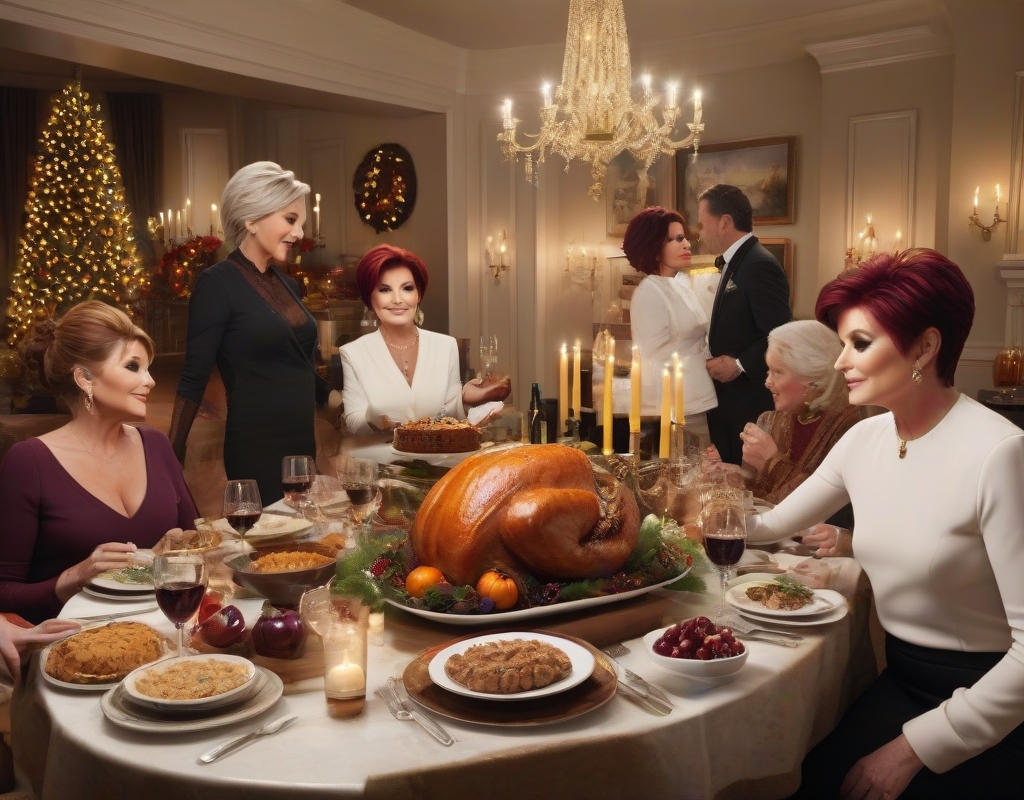Sharon Osbourne, the famously outspoken television personality and former judge on “The X Factor,” has made a strong declaration about her Thanksgiving Day plans, or more precisely, what she won’t be doing—cooking. Known for her direct and no-holds-barred approach, Osbourne has openly decided to skip the culinary responsibilities this holiday season, opting instead to have others take up the mantle of preparing the festive meal.
When asked if she would be overseeing the Thanksgiving dinner preparations, Osbourne’s response was as straightforward and emphatic as one might expect: an unequivocal “f*** no.” This kind of blunt refusal is consistent with her public persona, marked by her readiness to speak bluntly and eschew conventional expectations.
For Osbourne, stepping away from kitchen duties may suggest a broader commentary on traditional roles often assigned during such familial gatherings, which typically see women managing the cooking. By setting this boundary, she potentially challenges these norms, offering an empowering statement on reevaluating entrenched societal patterns and personal limits.
Sharon Osbourne’s life is a whirlwind of professional engagements, including new television projects and responsibilities spanning various countries. The dense scheduling might be a key reason behind her opting out of Thanksgiving cooking, shedding light on a pragmatic decision to manage her time wisely. She has often discussed how the relentless pace of her career mandates a prioritization of how she spends her downtime, reportedly emphasizing self-care and relaxation over obligatory domestic chores. This approach not only speaks to Osbourne’s personal choice but also reflects a broader necessity among high-profile personalities to maintain balance amid extensive demands.
Regarding the Osbourne family’s celebration plans, specifics remain undisclosed. Though it’s known that the family enjoys gathering for the holidays, exactly how they will come together without Sharon’s cooking has not been detailed. Historically, the Osbourne family celebrations are known for their untraditional flair, often shaped around what best suits their collective and individual interests, rather than conventional expectations. This adaptability points to a larger trend among contemporary families who increasingly tailor holiday observances to reflect personal preferences and shared values.
The implications of Osbourne’s decision are both cultural and social, symbolizing evolving dynamics surrounding holiday festivities. There is a noticeable shifting tide towards minimizing labor-intensive traditions in favor of experiences that foster personal joy and familial bonds. More families are choosing to dine out, order in, or undertake totally different activities, thus redefining holidays on their own terms.
This move also plays into wider considerations about mental health and self-care, especially significant during potentially stressful holiday seasons. As more public figures like Osbourne openly prioritize well-being over customary practices, it helps destigmatize the conversation about mental health, prompting more people to weigh personal happiness alongside traditional celebrations.
Experts from various fields note these changes with interest. Dr. Emily Spencer, a sociologist specializing in family dynamics, remarks on the significance of Osbourne’s choice, recognizing it as reflective of broader societal evolution towards flexible family roles and holiday expectations. Food industry insiders and gastronomists, such as TV host Daniel Hughes, also acknowledge the shift away from fixed culinary traditions. They note an increasing preference for authenticity and personal choice in how celebrations are conducted.
The broader dialogue Sharon Osbourne’s decision incites touches on gender roles and the division of labor in domestic settings. Historically, women have often been expected to manage the holiday meals, a standard that is gradually seeing reform. The ongoing shift encourages shared responsibilities and fosters inclusivity in preparing for and celebrating holidays, aligning with movements towards gender equality.
Ultimately, Sharon Osbourne’s deliberate choice not to cook for Thanksgiving is emblematic of her fierce independence and commitment to personal boundaries. It provides her audience a lens into her life, colored by humor and candidness. Her refusal to conform to traditional expectations not only strengthens her stand as a major cultural figure but also serves as inspiration for others rethinking their roles during holidays.
In essence, Sharon Osbourne’s straightforward declaration and the ensuing discussion provoke a broader reassessment of holiday traditions, urging a reevaluation of what truly matters: spending quality time with loved ones in ways that genuinely resonate. As society and its customs morph, figures like Osbourne pave the way for new norms, championing more meaningful and individually satisfying holiday engagements.




